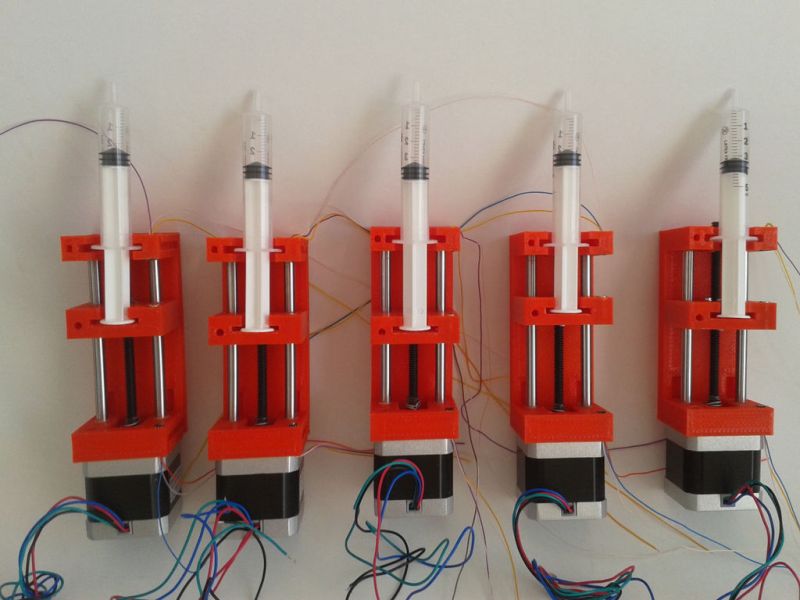Syringe pumps are valuable tools when specific amounts of fluid must be dispensed at certain rates and volumes. They are used in many ways, for administering IV medications to liquid chromatography (LC/HPLC). Unfortunately, a commercial pump can cost a pretty penny. Not particularly thrilled with the hefty price tag, [Aldric Negrier] rolled up his sleeves and made a 3D-printed version for 300 USD.
[Aldric] has been featured on Hackaday before, so we knew his latest project would not disappoint. His 3D Printed Syringe Pump Rack contains five individual pumps that can operate independently of each other. Five pieces are 3D-printed to form the housing for each pump. In addition, each pump is composed of a Teflon-coated lead screw, an Arduino Nano V3, a Pololu Micro stepper motor driver, and a NEMA-17 stepper motor. The 3D Printed Syringe Pump Rack runs on a 12V power supply using a maximum of 2 amps per motor.
While the standard Arduino IDE contains the Stepper library, [Aldric] wanted a library that allowed for more precise control and went with the Accelstepper library. The 3D Printed Syringe Pump Rack has a measured accuracy of 0.5µl in a 10ml syringe, which is nothing to laugh at.
Syringe pump racks like [Aldric’s] are another great example of using open source resources and the spirit of DIY to make typically expensive technologies more affordable to the smaller lab bench. If you are interested in other open source syringe pump designs, you can check out this entry for the 2014 Hackaday Prize.
















Woot! That’s *exactly* what I’m looking for for my project: something to dispense tiny, measured volumes of (in my case) gas.
I’ve even got steppers, Nanos, and pololu drivers on hand. This is going up on the printer next week.
Hackers are awesome!
Remember – gas is compressible. Using a syringe pump with gas may not get you what you want.
I think he means fuel/petrol.
I hope he DOESN’T mean gasoline, it will eat both the syringe and the pump body that was just printed.
Even if he means gas as the state of matter, with some fancier math on the firmware of the nanos he might be able to get usable results.
So is rubber. I am surprised at the accuracy in view of the sticky nature of those rubber pistons.
Precision could still be off.
Perhaps he is talking about the precision of the accuracy
is the 300usd for the 5 units or just 1? Surely for the 5!
5 steppers, 60$
if you have a printer, filament 5$
5 anyduino-freeshipping, 50$
5 steppers drivers, 50$
you can still add some stuff to make it 300$
*cough*, *cough*, $10 for 5 stepsticks on Ebay :D
cloneduino nano’s go for about $3.50 I believe. The shafts may set you back ~2.50-5.00 each, the bushings about $1-2 each. (I get the last two usually a pietrzak metalbau on ebay).
Wouldn’t hand drilling blocks of plywood be cheaper / faster / easier than 3d printing?
Cheaper, Definitely!
Faster, Of Course!!
Easier, Nah way too much manual work, CAD it and print it and spend your time working on code, etc waiting for your parts to finish printing.
as soon as you have the STL files and your printer is still in good condition after all these years,
definitively no.
This is a very printer friendly design and slots are not always easy to drill
yes and no… You could go the manual way, but than you need to improvise on the leadscrew nut, the slot where the plunger locks into and the hidden hall sensors. And to top it off, You need a good square joint between the back and both uprights, otherwise you will get play -> inaccuracy.
My question is what’s the cost of one syringe pump? because 5 for 300 seems to much. And i’m thinking, those who want some of these, could have a master programing unit.. and all the steppers linked there..
I think more than 30$ for a complete stepper, the screw and plastic printed case you are making money and not product cost.
i have updated the price of all the items. The most expensive part is the high precision lead screw and nut that cost more than 160€ for a set of 5 units.
I don’t see the need for using steppers for this. Using small 3-6V geared motors and drivers from dx.com could cut costs for this by 80-90%.
Would this be able to dispense solder paste or silicone or something similar in viscosity?
can i get the code for syringe pump
pls